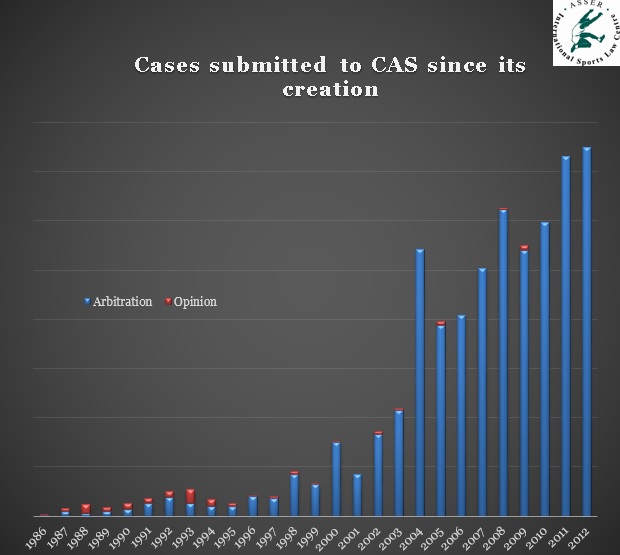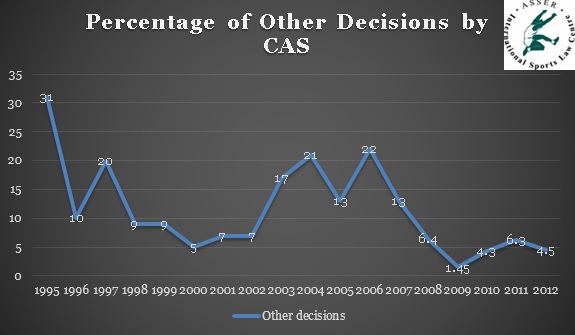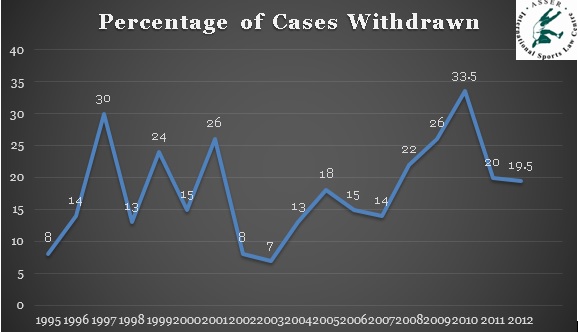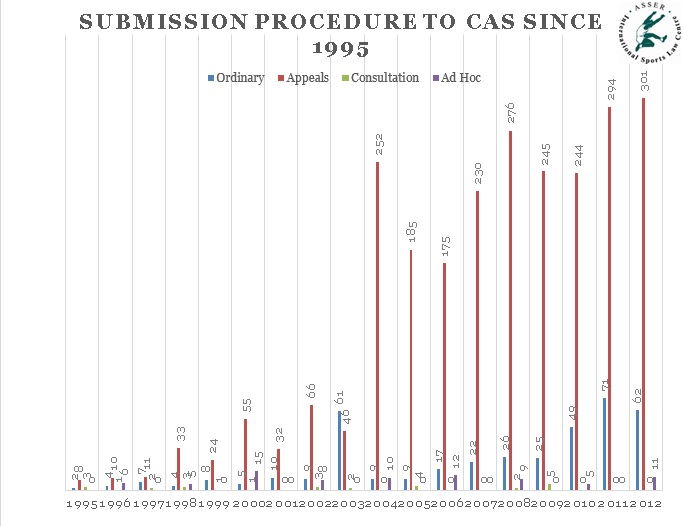
Graph 1: Number of Cases submitted to CAS (CAS Satistics)
The Court of Arbitration for Sport (CAS) is a fairly recent construct. It was created in 1984 under
the patronage of IOC’s former president Juan Antonio Samarranch. However, as is evident from Graph 1, it gained
prominence only at the turn of the century and reached the symbolic 100
cases/year bar only in 2003. This recent boom of the CAS docket is mainly due
to the adoption of the WADA code and the introduction thereafter of binding
arbitration clauses in the statutes and regulations of Sports Governing Bodies.
Nowadays, CAS is dealing with a caseload of more than 350 cases/year, which is
still growing constantly. From 2008 onwards CAS started even to experience pending
cases, as it was not able anymore to process all the cases submitted in one
calendar year (Graph 2). The steep fall of “other decisions” (Graph 3), a proxy
for decisions (mostly on procedural matters) not involving an award, might indicate that
the litigants and their lawyers have become more proficient in CAS procedure. Finally,
the number of cases withdrawn (Graph 4) has been varying a lot, without it
being possible to pin down any definitive cause explaining those variations. It
is, however, notable that more than 2/3 of the cases give way to an award.

Graph 2: Percentage of the cases resulting in an Award/Opinion vs.
Percentage of pending cases (Data CAS Statistics)

Graph 3: Percentage of
Procedures terminated by a CAS decision other than an award (Data CAS
statistics)

Graph 4: Percentage of
Cases withdrawn before a decision by the CAS (Data CAS statistics)
The breakdown of the way cases were submitted to CAS (Graph 5)
highlights very well the paramount role played by the 1994 reform process triggered by the Gundel ruling of the Swiss Federal Tribunal in
1993. Indeed, it is this reform process which enabled the final recognition
of CAS as an independent tribunal by the Swiss Federal Tribunal, a move
necessary to ensure the legitimacy of its awards. But, it is also the process
through which the appeal procedure of CAS got solidified and became highly valuable in the eyes of Sports
Governing Bodies. In light of the Bosman case and the perceived need for a
global anti-doping Court, CAS became both a recourse to protect the sporting
autonomy and a mean to ensure a harmonized anti-doping playing field. Thus it
is not surprising that with the entry into force of the first World Anti-Doping
Code in 2004 a huge jump in the number of CAS cases under the appeal procedure
can be observed (Graph 5), passing from 46 in 2003 to 252 in 2004 and growing
to 301 in 2012. In the meantime, the ordinary procedure cases have been stable
with 61 cases in 2003 and 62 in 2012. CAS’s success is largely the success of
the appeal procedure, but this appeal procedure seems potentially threatened after the recent Pechstein decision of the
Landesgericht München. Furthermore, since 1996 ad hoc CAS proceedings have been introduced. At first only for Olympic games
(every two-year) and more recently for other international
competitions. However, the caseload of the ad-hoc tribunals remains modest, the peak
was reached at the Sydney Olympic in 2000 with 15 cases, since then Ad-hoc
tribunals have been in the shadow of the prominent place taken by the Appeal
Procedure.

Graph 5: Types of procedure (Ordinary
Procedure, Appeal Procedure, Consultation Procedure and Ad-Hoc Procedure) under
which cases were submitted to CAS since 1995. (Data CAS statistics)
Finally, our last Graph 6 shows that the boom of the number of CAS
awards has quite logically triggered a steep rise in the number of appeals
against those awards submitted to the Swiss Federal Tribunal. Indeed, starting from
one or two decisions per year in the early 2000s, the Swiss Federal Tribunal is
now adopting more than 15 rulings per year on appeal of CAS awards. However,
very few of these decisions have overruled CAS awards, moreover once an award
is overruled it is usually sent back to CAS to decide de novo on the case, thus giving it the opportunity to correct any
procedural mistake leading to the annulment of the first award. This appeal
procedure is therefore rather a mock procedure; an appellant has very little
chances to succeed. In fact, it is only recently that in a case concerning a
CAS award (the Matuzalem
case),
the Swiss Federal Tribunal considered, for the first time, an arbitral award as
contradicting Swiss material public policy. The route to the Swiss Federal
Tribunal might be the most obvious to any athlete wishing to contest a CAS
award, but it is definitely a very difficult (and costly) one, leaving very few
reasons to hope for a final twist.

Graph 6: Number of
Decisions of the Swiss Federal Court in Appeal against CAS awards. (Data ASSER)
This report on the Court of Arbitration for Sport was aimed at fleshing
out the intuition of sports lawyers on the importance taken by CAS in
contemporary sports law practice with some “hard” data illustrating both the
temporal and quantitative shifts of the CAS relevance. The rise of the CAS
needed to be statistically deconstructed and analysed in order to fully grasp
the role it plays in the governance of sports. Furthermore, its interaction
with state courts, and in particular with the Swiss Federal Tribunal, deserves
close scrutiny. In many instances the Swiss Federal Tribunal is the sole forum
of review for CAS awards. This is particularly true for athletes, which have
usually been forced, in one way or another, to submit to arbitration. Thus, the
debates around the legitimacy and role of CAS in sports governance can only
gain from an enhanced knowledge of the empirical reality underlying the Court
of Arbitration for sport.
Indicative Bibliography on CAS:
A. Rigozzi,
Arbitrage International en matière de sport
A. Rigozzi,
Challenging Awards of the Court of Arbitration for Sport
G. Kaufmann-Kohler
Arbitration at the Olympics – Issues of Fast-Track Dispute
Resolution and Sports Law
M. Maisonneuve,
Arbitrage des litiges sportifs
I.S. Blackshaw, J. Soek, R. Siekmann
(Eds.), The Court of Arbitration for Sport 1984–2004
R. H. McLaren, Twenty-Five Years
of the Court of Arbitration for Sport: A Look in the Rear-View Mirror
D. Yi, Turning
Medals into Metal: Evaluating the Court of Arbitration for Sport as an
International Tribunal
The CAS Database of
awards
The CAS
Bulletin
The Swiss Federal
tribunal database
(French and German)